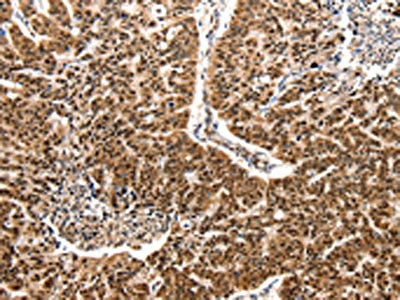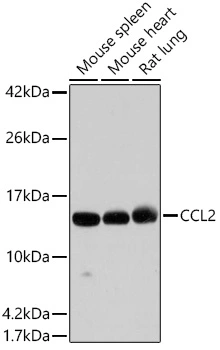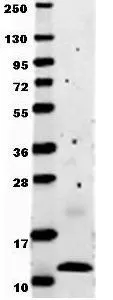MCP1 / CCL2 antibody [24822]
GTX10390
ApplicationsWestern Blot, Neutralisation/Blocking
Product group Antibodies
TargetCCL2
Overview
- SupplierGeneTex
- Product NameMCP1 / CCL2 antibody [24822]
- Delivery Days Customer9
- ApplicationsWestern Blot, Neutralisation/Blocking
- CertificationResearch Use Only
- ClonalityMonoclonal
- Clone ID24822
- ConjugateUnconjugated
- Gene ID6347
- Target nameCCL2
- Target descriptionC-C motif chemokine ligand 2
- Target synonymsGDCF-2, HC11, HSMCR30, MCAF, MCP-1, MCP1, SCYA2, SMC-CF, C-C motif chemokine 2, chemokine (C-C motif) ligand 2, monocyte chemoattractant protein-1, monocyte chemotactic and activating factor, monocyte chemotactic protein 1, monocyte secretory protein JE, small inducible cytokine A2 (monocyte chemotactic protein 1, homologous to mouse Sig-je), small inducible cytokine subfamily A (Cys-Cys), member 2, small-inducible cytokine A2
- HostMouse
- IsotypeIgG1
- Protein IDP13500
- Protein NameC-C motif chemokine 2
- Scientific DescriptionMonocyte chemotactic protein (MCP1) is also known as monocyte chemotactic and activating factor (MCAF). It is the product of the human JE gene. The precursor form of MCP1 consists of 99 amino acids with a signal peptide sequence consisting of 23 amino-terminal acids. The mature form of MCP1 has 4 cysteine residues. The first two cysteine residues are in an adjacent position C-C, which characterizes MCP1 as a member of the chemokine beta subfamily. rhMCP1 is a non-glycosylated protein consisting of 76 amino acids with a molecular weight of 8.7 kDa. MCP1 mRNA expression can be induced in monocytes/macrophages, B lymphocytes, endothelial cells and astrocytoma cells by LPS. IL1 will induce production of MCP1 in fibroblasts, keratinocytes, hepatoma cells and Type II pneumocytes. In vitro, MCP1 will act on monocytes to initiate chemotaxis, induce superoxide anion release, induce the release of lysosomal enzymes, and augment cytostatic activity. In vivo, MCP1 will induce macrophage infiltration. The MCP1 gene contains potential binding sites for several transcription factors, including AP1, AP2, NFkB, and NFIL6.
- Storage Instruction-20°C or -80°C,2°C to 8°C
- UNSPSC12352203


![WB analysis of tissue extracts (30 microg lysate) of Mouse Pancreas (Lane 1), Spleen (Lane 2), Lung (Lane 3) and Cerebellum (Lane 4) using GTX15784 MCP1 / CCL2 antibody [E10051]. Dilution : 1-2 microg/ml](https://www.genetex.com/upload/website/prouct_img/normal/GTX15784/GTX15784_1536_WB_w_23060620_978.webp)

![WB analysis of truncated MCP-1 recombinant protein using GTX83238 MCP1 / CCL2 antibody [1A7B8].](https://www.genetex.com/upload/website/prouct_img/normal/GTX83238/GTX83238_20170912_WB_w_23061322_173.webp)

